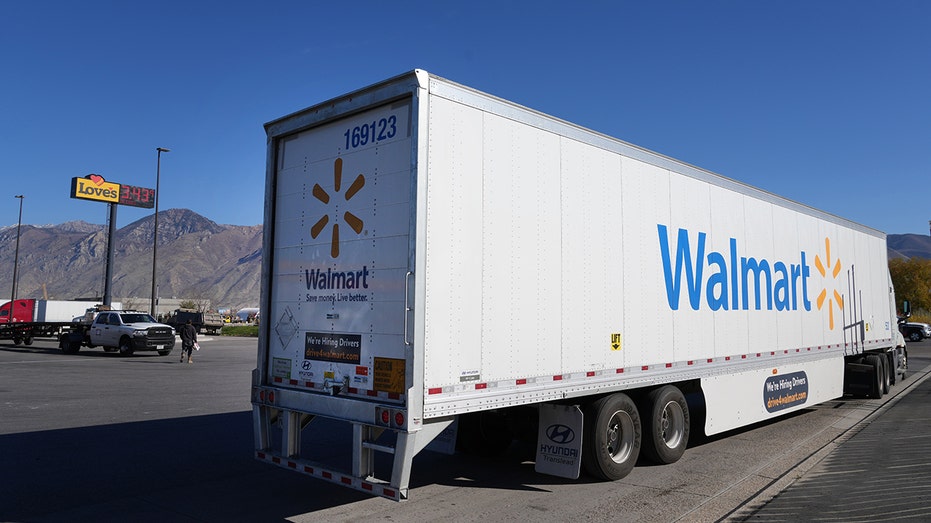FTC orders Walmart, Amazon, others to turn over information on supply chain issues
FTC will examine whether supply chain disruptions are causing specific bottlenecks, shortages, anticompetitive practices and consumer price increases
Black Friday is back as shoppers return to stores: Fmr. Toys 'R' US CEO
Storch Advisors CEO and former Toys ‘R’ Us CEO Gerald Storch talks inflation, labor costs, and how looting impacts businesses.
Nine major retailers, wholesalers and consumer good suppliers were ordered Monday to turn over detailed documents to the Federal Trade Commission (FTC) that may help identify what's driving global supply chain woes that are leaving stores with empty shelves and causing prices for goods to skyrocket.
CLICK HERE TO READ MORE ON FOX BUSINESS
The FTC asked Walmart, Amazon, Kroger, C&S Wholesale Grocers, Associated Wholesale Grocers, McLane, Procter & Gamble, Tyson Foods and Kraft Heinz to turn over "detailed information" within the next 45 days to help the agency study the disruptions "causing serious and ongoing hardships for consumers and harming competition in the U.S. economy."
| Ticker | Security | Last | Change | Change % |
|---|---|---|---|---|
| WMT | WALMART INC. | 131.18 | +4.24 | +3.34% |
| AMZN | AMAZON.COM INC. | 210.32 | -12.37 | -5.55% |
| KR | THE KROGER CO. | 67.50 | +0.83 | +1.24% |
"In addition to better understanding the reasons behind the disruptions," the FTC says it will examine whether these ongoing supply chain disruptions are causing specific bottlenecks, shortages and anticompetitive practices or if they are contributing to rising consumer prices.

A Walmart truck pulls away after fueling up along with other truckers at the Loves Truck stop on November 5, 2021 in Springville, Utah. (George Frey/Getty Images / Getty Images)
"Supply chain disruptions are upending the provision and delivery of a wide array of goods, ranging from computer chips and medicines to meat and lumber. I am hopeful the FTC’s new 6(b) study will shed light on market conditions and business practices that may have worsened these disruptions or led to asymmetric effects," said FTC Chair Lina Khan.
GET FOX BUSINESS ON THE GO BY CLICKING HERE
Nine wholesalers, retailers and suppliers are being asked to identify the "primary factors" that are impeding the ability to obtain, transport and distribute products. The companies are also being asked to detail the specific impact of the supply chain disruptions, such as causing delayed or canceled orders.
| Ticker | Security | Last | Change | Change % |
|---|---|---|---|---|
| PG | PROCTER & GAMBLE CO. | 159.17 | +0.60 | +0.38% |
| TSN | TYSON FOODS INC. | 65.26 | +0.06 | +0.09% |
| KHC | THE KRAFT HEINZ CO. | 24.64 | +0.20 | +0.80% |
The companies are also asked to provide information on increased costs and prices as well as what products, suppliers and inputs are most affected and what is being done to alleviate these disruptions, according to the agency.
As part of its study, the FTC also wants to know how the companies are allocating products among stores when they are in short supply.
"The FTC also is requiring the companies to provide internal documents regarding the supply chain disruptions, including strategies related to supply chains; pricing; marketing and promotions; costs, profit margins and sales volumes; selection of suppliers and brands; and market shares," the agency continued.
SUPPLY CHAIN PROBLEMS SHOW SIGNS OF EASING
The FTC is also seeking voluntary comments from retailers, consumer goods suppliers, wholesalers and consumers about how these supply chain issues are affecting competition in consumer goods markets.
The answers to this question will "provide an opportunity for market participants to surface additional issues and examples of how supply chain disruptions are affecting competition," the FTC said.
Each of the aforementioned companies has 45 days from the date of the order to respond to the FTC.





















